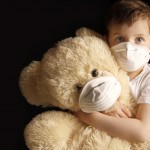Planning Ahead for H1N1...
 Wednesday, August 19, 2009 at 09:23AM
Wednesday, August 19, 2009 at 09:23AM
 Now that the kids are back in school many people are worried that the
Now that the kids are back in school many people are worried that the
So how worried should you be?
The Health and Human Services Secretary says "what we are seeing looks very much like seasonal flu so far." Most people suffer fever, body aches, sore throat and runny nose. Vomiting and diarrhea have been reported in about 50% of nonhospitalized patients with the virus. One thing that is different from the seasonal flu is that young people are getting sick, while the elderly, who normally account for 90% of annual deaths from flu do not seem as receptive to it. The CDC officials think this may be due to people 60 and older having some sort of immunity to the new virus from exposure to H1N1 viruses that circulated between 1918 and 1957.
The disease is being monitored closely and there are already a few good signs. For one thing, the new H1N1 virus lacks gene sequences that made the 1918 flu virus so deadly and it hasn't mutated into a more-virulent form despite its rapid spread. The groups most at risk are pregnant women and people with asthma, diabetes, heart disease and other chronic diseases. A vaccine is currently being developed which public health officials say is the best defense against the new flu. However, you may have to wait until well into flu season to get one. The first 45 million doses are expected to be ready by mid-October. The shots are set to be recommended first for those at highest risk of complications, as well as health-care workers and close contacts of infants.
At Champion we are doing everything possible to keep all of our employees healthy. We will be providing tissues, sanitizing wipes, disinfecting sprays and hand sanitizer for each office. We are also asking that all employees also do the following to keep their fellow employees safe and to keep Champion H1N1 free...
1. Follow public health advice regarding school closures, avoiding crowds and other social distancing measures.
In addition, The Georgia Department of Public Health is recommending everyone do the following:
2. Develop a family emergency plan as a precaution. This should include storing a supply of food, medicines, facemasks, alcohol-based hand sanitizers and other essential supplies.
We hope this information is helpful to others in the community so that we can all stay healthy this flu season.
 CDC,
CDC,  Champion,
Champion,  Champion Construction Systems,
Champion Construction Systems,  Community News,
Community News,  Community Service,
Community Service,  Company Information,
Company Information,  Emergency Planning,
Emergency Planning,  H1N1,
H1N1,  H1N1 Atlanta,
H1N1 Atlanta,  H1N1 GA,
H1N1 GA,  H1N1 Georgia,
H1N1 Georgia,  H1N1 Newnan,
H1N1 Newnan,  H1N1 Planning,
H1N1 Planning,  H1N1 deaths,
H1N1 deaths,  H1N1 workplace,
H1N1 workplace,  H1NI Flu vaccine,
H1NI Flu vaccine,  atlanta,
atlanta,  atlanta ga,
atlanta ga,  family emergency plan,
family emergency plan,  flu vaccine,
flu vaccine,  h1n1 virus,
h1n1 virus,  newnan ga,
newnan ga,  north atlanta,
north atlanta,  planning for swine flu,
planning for swine flu,  sharpsburg,
sharpsburg,  swine flu,
swine flu,  swine flu cdc,
swine flu cdc,  swine flu georgia,
swine flu georgia,  swine flu newnan,
swine flu newnan,  swine flu workplace,
swine flu workplace,  swine influenza,
swine influenza,  swine influenza atlanta ga
swine influenza atlanta ga  Email Article
Email Article 


Reader Comments